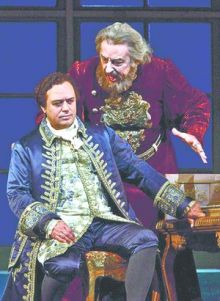Premier of Modest Mussorgsky’s Khovanshchina on the stage of New York Metropolitan Opera was a huge success. The performance received extremely positive reviews from American public and press “Blazingly sung, acted with conviction, and conducted with intensity by Kirill Petrenko, it is one of the best things the Met has done this season,” reported The New York Times.
ITAR-TASS reported that the part of shooters’ chief Prince Ivan Khovansky was performed by famous Ukrainian bass Anatolii Kocherha; the part of Khovansky’s son, Andrii, was performed by one of Ukraine’s famous tenors Mykhailo Didyk; the parts of raskolnitsa (a member of the fundamentalist Old Believers sect) Marfa, head of raskolniks Dosifei, and Prince Vasily Golitsyn – by soloists of Mariinsky Theater Olga Borodina, Ildar Abdrazakov, and Vladimir Galuzin respectively; the part of boyar Shaklovyty – by famous Gerogian baritone George Hahnidze.
The New York Times wrote: “The Met’s Russian, Ukrainian, and Georgian cast was idiomatic and consistently superb, led by the commanding bass Anatolii Kocherha in a belated, booming Met debut as Ivan Khovansky, the leader of a rebellion against the czar. The softness and steel in Olga Borodina’s mezzo-soprano were ideal for Marfa, a member of the fundamentalist Old Believers sect, with mystical tendencies.”
The rest of leading actors as well as the chorus, orchestra, and conductor, in particular, also received complimentary reviews. “Kirill Petrenko’s work makes a very deep impression. At times the orchestra sounded powerful and loud, however, in quiet and calm moments it played more restrain without dampening singers’ voices,” wrote American cultural critic. Petrenko, who in 2013 will become the music director of the Bavarian State Opera, debuted in Metropolitan in 2003 with operetta Merry Widow by Franz Lehar.
“Music and the plot of Khovanshchina are very much in folk style,” said Mykhailo Didyk, singer of the part of Andrii Khovansky after the general rehearsal. “This opera is somewhat difficult for understanding, especially if a person is not familiar with historical events of that time. But I think that the American audience will enjoy it.”
Anatolii Kocherha, singer of the part of Ivan Khovansky agreed with his colleague. The singer, for whom Khovanshchina was the debut on the stage of Metropolitan Opera said: “This opera is easy to understand even if people do not know Russian. Music by Mussorgsky is grand and people will be pleased to visit a different world with it. I am very glad that there are no avant-garde ‘tricks’ or attempts to modernize music in this staging.”
Indeed, the audience openly expressed their delight with the opera, emphasizing that it was in no way confusing for them.
There were stunning scenery and costumes made for a performance that involved dozens of people. The final scene of self-immolation of old believers that involved over 80 people itself was worth a lot. The opera is performed in Russian but for the convenience of the audience special electronic boards were incorporated in the back seat in front of them with a “roll captions” of simultaneous translation in English.
Mussorgsky began writing Khovanshchina in 1872 but never finished it. It is performed on the stage of the Metropolitan Opera in the orchestration by Dmitri Shostakovich, the last scene – by Igor Stravinsky. “Dancing of Persian Women” in the fourth act was staged by the well-known French choreographer Benjamin Millepied, famous for directing all the ballet dancing in the cinema hit Black Swan by Darren Aronofsky. It was his debut on the stage of New York Theater. Khovanshchina was first staged in the Metropolitan Opera in 1985 by German master of opera directing August Everding. The opera came down from the stage after the season of 1998-99. This season will see six performances of Khovanshchina on the stage of New York Theater. The last show will take place on March 17.







